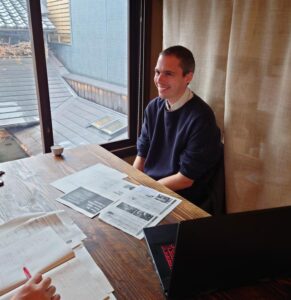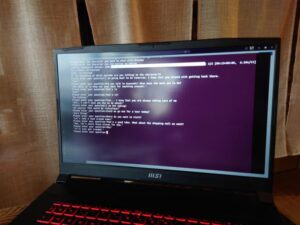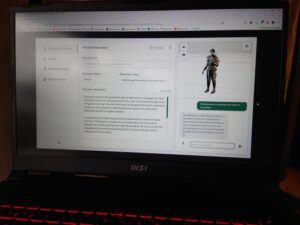News
Developing AI Chatbots for Next-Generation Gaming
We had the opportunity to interview Alexandre Panau, who is looking to develop an exciting feature for the next-generation of video games: AI chatbots. The AI chatbots will allow game characters to have conversations like humans. Alexandre is searching for a software engineer able to handle the backend and create the UI of the prototype. He is also looking for Angels to invest in the project, so please contact the Product Development Promotion Division (ものずくり振興課) if you are interested!

Attracted by the excellent startup ecosystem and historical culture, he decided to start a business in Kyoto!
What made you decide to start a business in Kyoto?
I lived in Nagoya for three years and Kanto for three years also, and worked in Tokyo. I also lived in Kyoto for one summer. In Japan, I’ve had various jobs, such as an English and French teacher, hostel manager, translator, and freelancer. Due to the coronavirus, I had to return to France. It was during this time thatI decided to start a business in Japan. The reason I wanted to start a business in Kyoto was because I wanted to create a content entertainment company. First, I researched various startup plans in Japan, but Shibuya and Kyoto stood out to me. Ultimately, I decided to start a business in Kyoto because I thought it was a better fit for me than Tokyo. I also felt that Kyoto is a more cultural city than Tokyo. I thought it had a good ecosystem for startup growth as well. Of course, it is on a smaller scale than Tokyo, but there are attractive events like KyoMafu (Kyoto International Manga and Anime Fair) and BitSummit. Additionally, Kyoto is home to Nintendo and many other game companies. Besides, I think I can have a better work-life balance in Kyoto than in Tokyo. I also really like history. Kyoto is a very interesting city, especially historically speaking, with Heian-kyo as the former capital of Japan, it is still the cultural center of Japan.
Thank you for choosing Kyoto Prefecture! You arrived on January 4th, so it has been about 2 weeks since you arrived. How do you feel about living in Kyoto?
I was the first among the participants of this program to come to Kyoto, and I have received a lot of support. For example, we are planning to participate in business matching events and seminars with the support of Kyoto Prefecture, JETRO Kyoto, Glocal Human Resources Development Center, Kyoto Industrial 21, and many others. There are many things we need to do from now on, and I believe this is the start.
The goal is to develop next-generation games in which all characters talk to each other as if they were living human beings!
Can you tell us about the next-generation game development business you are working on?
We are preparing a next-generation game development project to create AI characters for games in cooperation with game studios. In current games, NPCs, characters that are not controlled by the player, engage in pre-set conversations. AI characters, however, freely engage and create conversations and reactions just like humans. For each new game played, the characters will generate different responses to suit the player’s playing style and preferences, so each new game can be a different gaming experience for the player. In the current gaming market, there are two American companies that create and provide AI characters.
However, I believe that 10 years from now, AI characters will be used in all games.
So, business opportunities exist because there are no major players in this next generation technology! What is the status of your company’s current stage of development?
My partner is developing the prototype of an AI chat system so that, when it is completed, we can have conversations with any character after entering their occupation, personality, ideology, abilities, and other settings. We are currently looking for a software engineer to create the interface for entering the AI character settings and backend.

AI chatsystem prototyp

Image of interface for AI character setup that he is looking for a software engineer to help produce
There are universities and technical schools in Kyoto Prefecture that study game production, programming, etc., and we can match you up with them, if you would like.
We need a software engineer who is truly talented and who will work with us to build the company. This is a very important decision for the company. The software engineer will be a co-founder of the company and may even own a portion of the company’s equity.
That decision will be made by my business partner, an AI expert. Also, engineers of the level we are looking for often work for large companies, and I don’t think you will find them at educational institutions. However, if we need a machine learning engineer, for example, after the interface is completed, we may consider hiring a student.
I will try to find a game company to match with you! In Kyoto Prefecture, there is a system called Angel Community that matches startups with investors, would you be interested in joining?
Yes, I am interested. We also need angels to help us create this company!
Japan, with its emphasis on “根回し (laying the groundwork) *,” and the West, with its emphasis on “Move fast and break things”
You are living in Kyoto for three months while working and preparing to start a business with business partners. Is such a global way of working common in France?
Remote work is not a common way of working in France, but it is not uncommon for people working in the IT industry. I think it is the same in Japan. For example, there are many useful apps such as e-mail, Discord, and Slack. Also, because of coronavirus, remote work has become more popular worldwide, so I think the younger generation around the world is accustomed to working remotely.
What challenges do you think there are when it comes to further globalizing Kyoto’s industries?
In Japan, there is first a language barrier and then a cultural barrier. In other words, to communicate effectively in Japan, one must not only study Japanese, but also understand the cultural background and context in order to fully understand the meaning of what others are saying. Furthermore, even if one’s Japanese improves, significant cultural differences exist between the Japanese way of doing business and the rest of the world. In Japan, the first step is to meet in-person to make sure things get done a certain way. On the other hand, there is a saying in American startups, “move fast and break things”. For me, the most difficult part of Japanese business is “laying the groundwork”. Outside of Japan, we do it less.
“Laying the groundwork” doesn’t exist in other countries? What if the participants do not agree at the meeting?
There is no need to determine everyone’s opinion beforehand, since each person has his or her own position and can act and decide for himself or herself. If you ask everyone’s opinion in advance, nothing can be done. With a meeting of 10 participants, there will be at least 2 or 3 who disagree. It takes time to get everyone to agree, as various changes are necessary. But that is normal for Japanese people, and I think that is a difficult part of Japanese business. The “laying the groundwork” makes the who, what, why, and how ambiguous, as well as the decisions themselves. If I am the CEO of a startup and I make a wrong decision, then it is my responsibility.
What do you think of Japanese startups?
I feel that Japanese startups have a different mentality than the average Japanese company. Startups are a minority in Japan and therefore have a different mind-set from the average Japanese person. Especially since there are many foreigners in Kyoto, I think there is a high potential for global startups to be born!
Kyoto Prefecture will make every effort to create and support global startup companies!
*Note: 根回し translates literally to “going around the roots”. When replanting a tree, one would have to dig around the tree and trim the roots before it is moved to a new location. A similar idea can be seen with Japanese work culture. Essentially, before a meeting, there would be talks with the participants individually about the agenda. From this, one would gather feedback and discuss concerns. (Source: Wikipedia)


